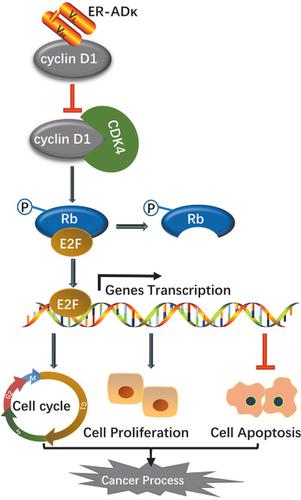当前位置:
X-MOL 学术
›
Biotechnol. J.
›
论文详情
Our official English website, www.x-mol.net, welcomes your
feedback! (Note: you will need to create a separate account there.)
A Cyclin D1-Specific Single-Chain Variable Fragment Antibody that Inhibits HepG2 Cell Growth and Proliferation.
Biotechnology Journal ( IF 3.2 ) Pub Date : 2020-03-14 , DOI: 10.1002/biot.201900430 Yan Wu 1, 2 , Weiwei Tang 1, 3, 4 , Yuhua Cao 1 , Dazhi Jiang 1 , Liangzhong Zhao 1, 5 , Jialiang Zhao 1 , Ying Zhang 1, 6 , Chengjuan Li 1 , Cheng Cheng 1 , Shuai Wang 1 , Fang Yang 1 , Xun Zhu 7 , Guiying Li 1
Biotechnology Journal ( IF 3.2 ) Pub Date : 2020-03-14 , DOI: 10.1002/biot.201900430 Yan Wu 1, 2 , Weiwei Tang 1, 3, 4 , Yuhua Cao 1 , Dazhi Jiang 1 , Liangzhong Zhao 1, 5 , Jialiang Zhao 1 , Ying Zhang 1, 6 , Chengjuan Li 1 , Cheng Cheng 1 , Shuai Wang 1 , Fang Yang 1 , Xun Zhu 7 , Guiying Li 1
Affiliation

|
Cyclin D1 is a key regulatory factor of the G1 to S transition during cell cycle progression. Aberrant cyclin D gene amplification and abnormal protein expression have been linked to hepatocellular carcinoma (HCC) tumorigenesis. Intrabodies, effective anticancer therapies that specifically inhibit target protein function within all intracellular compartments, may block cyclin D1 function. Here, a single‐chain variable fragment (scFv) antibody against cyclin D1 (ADκ) selected from a human semi‐synthetic phage display scFv library is expressed in Escherichia coli as soluble ADκ. Purified ADκ specifically binds to recombinant and endogenous cyclin D1 with high affinity. To enable blocking of intracellular cyclin D1 activity, an endoplasmic reticulum (ER) retention signal sequence is added to the ADκ sequence to encode anti‐cyclin D1 intrabody ER‐ADκ. Transfection of HepG2 cells with expression vector encoding ER‐ADκ elicited intracellular ER‐ADκ expression leading to cyclin D1 binding, significant G1 phase arrest, and apoptosis that are mechanistically tied to decreased intracellular phosphorylated retinoblastoma protein (Rb) levels. Meanwhile, ER‐ADκ dramatically inhibited subcutaneous human HCC xenografts growth in nude mice in vivo after injection of tumors with expression vector encoding ER‐ADκ. These results demonstrate the potential of intrabody‐based cyclin D1 targeting therapy as a promising treatment for HCC.
中文翻译:

抑制HepG2细胞生长和增殖的Cyclin D1特异性单链可变片段抗体。
细胞周期蛋白D1是细胞周期进程中G1向S过渡的关键调控因子。异常的细胞周期蛋白D基因扩增和蛋白表达异常与肝细胞癌(HCC)的肿瘤发生有关。体内抗体是一种有效的抗癌疗法,可特异性抑制所有细胞内区隔中的靶蛋白功能,可能会阻断细胞周期蛋白D1的功能。在这里,针对人半合成噬菌体展示scFv文库的细胞周期蛋白D1(ADκ)的单链可变片段(scFv)抗体在大肠杆菌中表达作为可溶性ADκ。纯化的ADκ以高亲和力特异性结合重组和内源性细胞周期蛋白D1。为了阻止细胞内细胞周期蛋白D1的活性,将内质网(ER)保留信号序列添加到ADκ序列中以编码抗细胞周期蛋白D1体内ER‐ADκ。用编码ER‐ADκ的表达载体转染HepG2细胞会引起细胞内ER‐ADκ表达,从而导致细胞周期蛋白D1结合,显着的G1期阻滞和细胞凋亡,这些现象与降低的细胞内磷酸化视网膜母细胞瘤蛋白(Rb)水平密切相关。同时,在用编码ER-ADκ的表达载体注射肿瘤后,ER-ADκ在体内显着抑制了裸鼠体内皮下人HCC异种移植物的生长。
更新日期:2020-03-14
中文翻译:

抑制HepG2细胞生长和增殖的Cyclin D1特异性单链可变片段抗体。
细胞周期蛋白D1是细胞周期进程中G1向S过渡的关键调控因子。异常的细胞周期蛋白D基因扩增和蛋白表达异常与肝细胞癌(HCC)的肿瘤发生有关。体内抗体是一种有效的抗癌疗法,可特异性抑制所有细胞内区隔中的靶蛋白功能,可能会阻断细胞周期蛋白D1的功能。在这里,针对人半合成噬菌体展示scFv文库的细胞周期蛋白D1(ADκ)的单链可变片段(scFv)抗体在大肠杆菌中表达作为可溶性ADκ。纯化的ADκ以高亲和力特异性结合重组和内源性细胞周期蛋白D1。为了阻止细胞内细胞周期蛋白D1的活性,将内质网(ER)保留信号序列添加到ADκ序列中以编码抗细胞周期蛋白D1体内ER‐ADκ。用编码ER‐ADκ的表达载体转染HepG2细胞会引起细胞内ER‐ADκ表达,从而导致细胞周期蛋白D1结合,显着的G1期阻滞和细胞凋亡,这些现象与降低的细胞内磷酸化视网膜母细胞瘤蛋白(Rb)水平密切相关。同时,在用编码ER-ADκ的表达载体注射肿瘤后,ER-ADκ在体内显着抑制了裸鼠体内皮下人HCC异种移植物的生长。











































 京公网安备 11010802027423号
京公网安备 11010802027423号